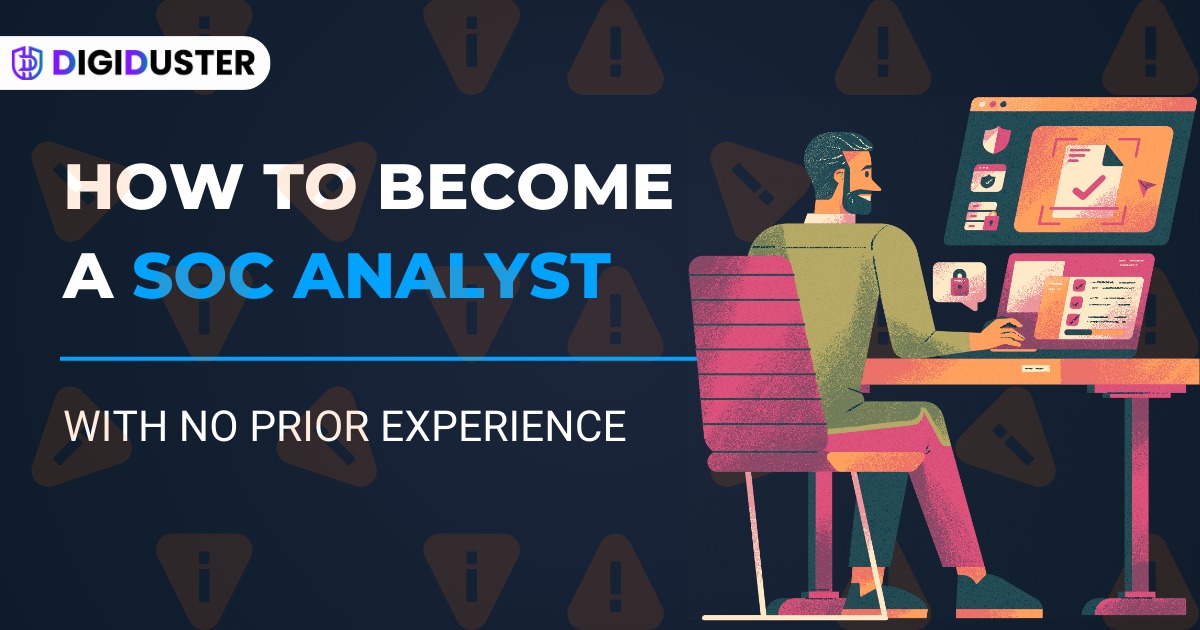In today’s digital age, cybersecurity is more critical than ever. Organizations rely on Security Operations Center (SOC) analysts to monitor, detect, and respond to cyber threats. If you’re interested in a cybersecurity career but lack prior experience, becoming a SOC analyst is an excellent entry point. This guide will walk you through the essential steps on how to become a SOC analyst with no prior experience.
What is a SOC Analyst?
A SOC analyst is a cybersecurity professional responsible for monitoring, detecting, and responding to security incidents in an organization. They work in a Security Operations Center (SOC) and play a crucial role in ensuring network security and protecting sensitive data from cyber threats.
Key Responsibilities of a SOC Analyst:
- Monitoring security events using SIEM (Security Information and Event Management) tools.
- Investigating and responding to security incidents.
- Conducting threat intelligence and vulnerability assessments.
- Coordinating with IT and security teams to improve overall security posture.
- Analyzing logs and alerts to identify potential threats.
- Documenting and reporting security incidents to higher-level cybersecurity professionals.
- Implementing security measures to strengthen an organization’s defence against cyberattacks.
Why Become a SOC Analyst?
The demand for cybersecurity professionals is growing rapidly. Here are a few reasons why becoming a SOC analyst is a great career choice:
- High demand: Companies worldwide are looking for skilled cybersecurity professionals.
- Great salary potential: SOC analysts earn competitive salaries even at entry levels.
- Career growth: This role serves as a stepping stone to higher cybersecurity positions like SOC Engineer, Incident Responder, or Security Architect.
- No formal degree required: Many SOC analysts break into the field without a traditional IT degree.
Steps to Become a SOC Analyst with No Experience
1. Gain Basic IT and Networking Knowledge
Before diving into cybersecurity, you need a foundational understanding of IT and networking. Some key areas to focus on include:
- Operating Systems: Learn about Windows, Linux, and macOS security features.
- Networking Basics: Understand TCP/IP, firewalls, and network security.
- Command Line Usage: Master Linux and Windows command-line tools.
- Cloud Security: Get familiar with cloud computing security concepts as many businesses are migrating to cloud platforms.
Resources to Learn IT & Networking:
- CompTIA Network+ certification
- Cisco’s CCNA course
- Free YouTube tutorials and cybersecurity blogs
See also: AI in Real Estate: How AI is Transforming Housing
2. Learn Cybersecurity Fundamentals
To become a SOC analyst, you must understand core cybersecurity concepts such as:
- Cyber threats and attack vectors
- Malware analysis and incident response
- Security tools like SIEM, IDS/IPS, and endpoint protection
- Understanding SOC processes and methodologies
Best Learning Resources:
- CompTIA Security+
- Cybrary’s free cybersecurity courses
- TryHackMe and Hack The Box for hands-on cybersecurity training
- Books like “The Cybersecurity Analyst Handbook”
3. Get Hands-on Experience with Labs and Simulations
Practical experience is crucial. Set up your own lab environment using:
- Virtual Machines: VMware, and VirtualBox for practicing Linux and Windows security tools.
- Online labs: Hack The Box, TryHackMe, and Cybersecurity Blue Team exercises.
- Open-source SIEM tools: Splunk, Wazuh, or ELK stack.
- Capture The Flag (CTF) competitions: Participate in cybersecurity competitions to practice ethical hacking.
4. Earn Industry-Recognized Certifications
Certifications validate your skills and make you stand out to employers. Consider obtaining:
- CompTIA Security+ (Entry-level cybersecurity certification)
- Certified SOC Analyst (CSA) by EC-Council
- Splunk Certified User (For SIEM tool expertise)
- GIAC Security Essentials (GSEC) (Advanced security knowledge)
- Microsoft SC-900 (Microsoft Security Compliance and Identity Fundamentals)
- CompTIA CySA+ (Cybersecurity Analyst certification for mid-level expertise)
See also: How to Start a Business with Low Investment
5. Build a Strong Resume and LinkedIn Profile
Your resume should highlight:
- Self-learning initiatives (courses, labs, certifications)
- Hands-on projects or labs
- Transferable skills from previous jobs
- A well-structured LinkedIn profile showcasing cybersecurity knowledge
Additional tips:
- Connect with cybersecurity professionals on LinkedIn.
- Join cybersecurity communities like Reddit’s r/cybersecurity and Blue Team Village.
- Share your cybersecurity projects and findings on LinkedIn and GitHub.
6. Apply for Entry-Level Positions and Internships
Many companies hire candidates for:
- Entry-level SOC Analyst (Tier 1)
- IT Support with cybersecurity responsibilities
- Cybersecurity apprenticeships or internships
Networking through LinkedIn, attending cybersecurity conferences, and joining online forums can help you connect with industry professionals.
Career Growth and Future Prospects
Once you gain experience as a SOC analyst, you can progress in your cybersecurity career. Potential career paths include:
- SOC Engineer: Specializing in managing and optimizing security tools and infrastructure.
- Incident Responder: Investigating and handling security breaches and cyber incidents.
- Cybersecurity Consultant: Advising businesses on best security practices.
- Security Architect: Designing and implementing security solutions for organizations.
- Penetration Tester (Ethical Hacker): Conducting security assessments and ethical hacking tasks.
Salary Expectations
- Entry-Level SOC Analyst: $50,000 – $70,000 per year
- Mid-Level SOC Analyst: $75,000 – $100,000 per year
- Senior SOC Analyst / Incident Responder: $100,000+ per year
- Salaries vary depending on location, certifications, and experience.
See also: Best Marketing Strategies for Small Businesses in 2025
Conclusion
Breaking into cybersecurity as a SOC analyst without experience is achievable with dedication and the right approach. By gaining foundational knowledge, earning certifications, practising in labs, and networking with industry professionals, you can land your first SOC analyst role and build a successful career in cybersecurity.
Start your journey today by enrolling in a free cybersecurity course and joining cybersecurity communities. If you have any questions, share them in the comments or connect with us for guidance!



